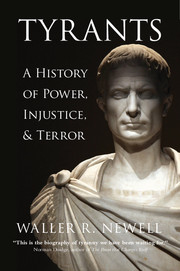Book contents
- Frontmatter
- Contents
- Preface
- Acknowledgments
- Introduction: The Strange Career of Tyranny
- Part One The Rage of Achilles: From Homeric Heroes to Lord and God of the World
- Part Two City of God or City of Man? The Tyrant as Modern State Builder
- Part Three The Eagles Will Drop Dead from the Skies: Millenarian Tyranny from Robespierre to Al Qaeda
- Conclusion How Democracy Can Win
- Reading for Further Interest
- Index
Conclusion - How Democracy Can Win
Published online by Cambridge University Press: 05 March 2016
- Frontmatter
- Contents
- Preface
- Acknowledgments
- Introduction: The Strange Career of Tyranny
- Part One The Rage of Achilles: From Homeric Heroes to Lord and God of the World
- Part Two City of God or City of Man? The Tyrant as Modern State Builder
- Part Three The Eagles Will Drop Dead from the Skies: Millenarian Tyranny from Robespierre to Al Qaeda
- Conclusion How Democracy Can Win
- Reading for Further Interest
- Index
Summary
On the first page of this book, I suggested that you might not find it worth reading any further if you were confident that the progress of history was making tyranny a thing of the past – that, despite a few bumps in the road like ISIS or Putin, we were heading inevitably toward the spread of American-style democracy around the world. If you've made it this far, that means you're willing to entertain the possibility that the danger of tyranny is a permanent feature of the human and political landscape, as much now as ever. It's never going away, and neither is the need to defend free self-governing societies against it.
How does the world look when we remove our rose-colored “end of history” glasses and view it straight on? The world is what it has always been. But we will see it rather differently. Let's do a world tour with our three main varieties of tyranny as the guidebook.
ALL ABOARD FOR THE TYRANNY TOUR
Garden-variety kleptocratic tyrannies have been alive and well all along. Sometimes they are dressed up with the tired principle of belonging to “the developing world” (examples include much of Africa, the Arab Baathist dictatorships, Haiti's Duvaliers) as a lure for foreign aid to be filched (Malawi's former president Bakili Muluzi has been accused of embezzling twelve million dollars of foreign-aid money, one on a long list of such scandals), sometimes used to cobble together made-up countries (Jordan, for example, the original intended Palestinian state, with its British-backed Hashemite monarchy), sometimes masked with a pretense of piety (the Saudis, who hide in their luxurious compounds while their subjects are left to the tender mercies of the harshest Salaafist version of Sharia law). Fidel Castro is, as I write, the last of the club of satellite Soviet dictators. By allowing his brother to lift a few restrictions on business and travel in pursuit of normalizing relations with the U.S., he apparently hopes to stave off the fate of Ceausescu and other long-gone communist dictators while holding onto supreme control for his prosperous clan.
- Type
- Chapter
- Information
- TyrantsA History of Power, Injustice, and Terror, pp. 211 - 232Publisher: Cambridge University PressPrint publication year: 2016



